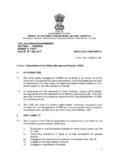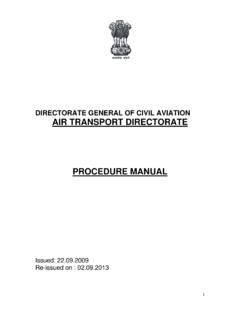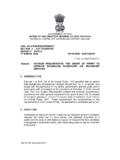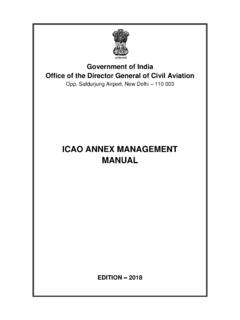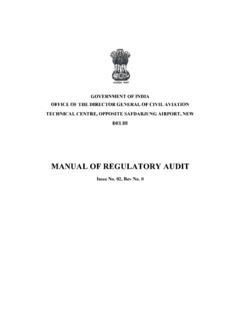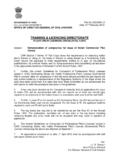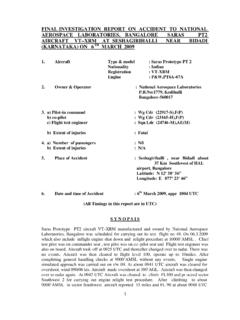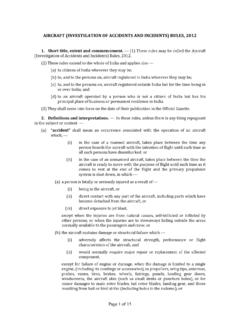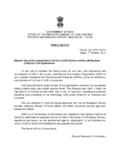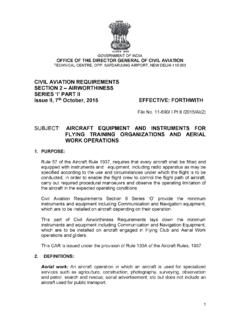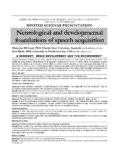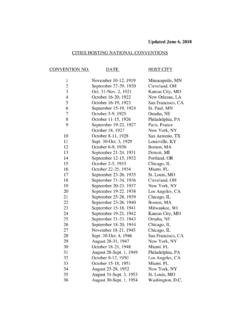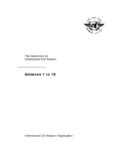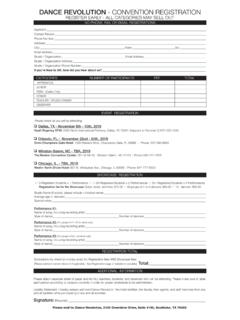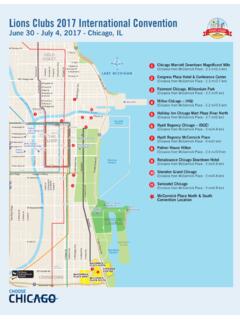Transcription of CHAPTER I CONVENTION ON INTERNATIONAL …
1 CHAPTER ICONVENTION ON INTERNATIONAL civil AVIATIONSIGNED AT chicago ON 7TH DECEMBER, 1944(THE chicago CONVENTION , 1944)34[Intentionally left blank]5 PREAMBLEWHEREAS the future development ofinternational civil aviation can greatly help tocreate and preserve friendship andunderstanding among the nations and peoplesof the world, yet its abuse can become a threatto the general security; andWHEREAS it is desirable to avoid frictionand to promote that cooperation betweennations and peoples upon which the peace ofthe world depends;THEREFORE, the undersigned governmentshaving agreed on certain principles andarrangements in order that INTERNATIONAL civilaviation may be developed in a safe and orderlymanner and that INTERNATIONAL air transportservices may be established on the basis ofequality of opportunity and operated soundlyand economically.
2 Have accordingly concluded thisConvention to that IAIR NAVIGATIONCHAPTER IGENERAL PRINCIPLE ANDAPPLICATION OF THECONVENTIONA rticle 1 SovereigntyThe contracting States recognize that everyState has complete and exclusive sovereigntyover the airspace above its 2 TerritoryFor the purposes of this CONVENTION theterritory of a State shall be deemed to be theland areas and territorial waters adjacent theretounder the sovereignty, suzerainty, protectionor mandate of such 3 civil and state aircraft(a) This CONVENTION shall be applicableonly to civil aircraft, and shall not be applicableto state aircraft.
3 (b) Aircraft used in military, customs andpolice services shall be deemed to be stateaircraft.(c) No state aircraft of a contracting Stateshall fly over the territory of another State orland thereon without authorization by specialagreement or otherwise, and in accordancewith the terms thereof.(d) The contracting States undertake whenissuing regulations for their state aircraft, thatthey will have due regard for the safety ofnavigation of civil ICONVENTION ON INTERNATIONAL civil AVIATIONSIGNED AT chicago ON 7TH DECEMBER, 1944*(THE chicago CONVENTION , 1944)*Came into force on 4th April, 1947, the thirtieth day after deposit with the Government of the United States of Americaof the twenty sixth instrument of ratification thereof or notification of adherence thereto, in accordance with Article91(b).
4 As on 30 June, 2003 there were 188 contracting States party to ratified it on 1 March, chicago CONVENTION , 1944 CHAP. I6 Article 3 bis*(a) The contracting States recognize thatevery State must refrain from resorting to theuse of weapons against civil aircraft in flightand that, in case of interception, the lives ofpersons on board and the safety of aircraftmust not be endangered. This provision shallnot be interpreted as modifying in any way therights and obligations of States set forth in theCharter of the United Nations.(b) The contracting States recognize thatevery State, in the exercise of its sovereignty,is entitled to require the landing at somedesignated airport of a civil aircraft flyingabove its territory without authority or if thereare reasonable grounds to conclude that it isbeing used for any purpose inconsistent withthe aims of this CONVENTION ; it may also givesuch violations.
5 For this purpose, thecontracting States may resort to any appropriatemeans consistent with relevant rules ofinternational law, including the relevantprovisions of this CONVENTION , specificallyparagraph (a) of this Article. Each contractingState agrees to publish its regulations in forceregarding the interception of civil aircraft.(c) Every civil aircraft shall comply with anorder given in conformity with paragraph (b)of this Article. To this end each contractingState shall establish all necessary provisions inits national laws or regulations to make suchcompliance mandatory for any civil aircraftregistered in that State or operated by anoperator who has his principal place of businessor permanent residence in that State.
6 Eachcontracting State shall make any violation ofsuch applicable laws or regulations punishableby severe penalties and shall submit the case toits competent authorities in accordance withits laws or regulations.(d) Each contracting State shall takeappropriate measures to prohibit the deliberateuse of any civil aircraft registered in that Stateor operated by an operator who has his principalplace of business or permanent residence inthat State for any purpose inconsistent withthe aims of this CONVENTION . This provisionshall not affect paragraph (a) or derogate fromparagraphs (b) and (c)
7 Of this 4 Misuse of civil aviationEach contracting state agrees not to usecivil aviation for any purpose inconsistent withthe aims of this IIFLIGHTS OVER TERRITORYOF CONTRACTING STATESA rticle 5 Right of non-scheduled flightEach contracting State agrees that all aircraftof the other contracting States, being aircraftnot engaged in scheduled INTERNATIONAL airservices shall have the right, subject to theobservance of the terms of this CONVENTION , tomake flights into or in transit non-stop acrossits territory and to make stops for non-trafficpurposes without the necessity of obtainingprior permission, and subject to the right of theState flown over to require landing.
8 Eachcontracting State nevertheless reserves theright, for reasons of safety of fight, to requireaircraft desiring to proceed over regions whichare inaccessible or without adequate airnavigation facilities to follow prescribed routes,or to obtain special permission for such aircraft, if engaged in the carriage ofpassengers, cargo, or mail for remuneration orhire on other than scheduled INTERNATIONAL airservices, shall also, subject to the provisionsof Article 7, have the privilege of taking on orCHAP. ITHE chicago CONVENTION , 1944** On 10 May, 1984, the Assembly amended the CONVENTION by adopting the Protocol introducing Article 3 bis.
9 UnderArticle 94(a) of the CONVENTION , the amendment came into force on 1 October, 1998, in respect of States which ratified it. There were 125 States party to it as on 30 June, has not ratified passengers, cargo, or mail, subjectto the right of any State where such embarkationor discharge takes place to impose suchregulations, conditions or limitations as it mayconsider 6 Scheduled air servicesNo scheduled INTERNATIONAL air service maybe operated over or into the territory of acontracting State, except with the specialpermission or other authorization of that State.
10 And in accordance with the terms of suchpermission or 7 CabotageEach contracting State shall have the rightto refuse permission to the aircraft of othercontracting States to take on in its territorypassengers, mail and cargo carried forremuneration or hire and destined for anotherpoint within its territory. Each contracting Stateundertakes not to enter into any arrangementswhich specifically grant any such privilege onan exclusive basis to any other State or anairline of any other State, and not to obtain anysuch exclusive privilege from any other 8 Pilotless aircraftNo aircraft capable of being flown withouta pilot shall be flown without a pilot over theterritory of a contracting State without specialauthorization by that State and in accordancewith the terms of such authorization.
